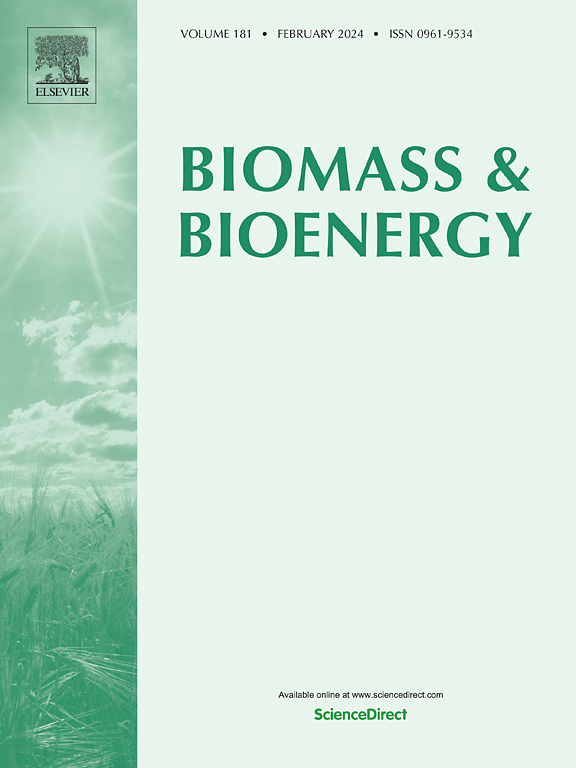Sustainable biodiesel production: Forecasting agricultural waste utilization in Türkiye's oilseed industry
IF 5.8
2区 生物学
Q1 AGRICULTURAL ENGINEERING
引用次数: 0
Abstract
This study developed and validated semi-empirical models to forecast Türkiye's oilseed production, consumption, waste generation, and biodiesel potential through 2040, utilizing 22 years of historical data and population projections. The models, assessed through Mean Absolute Percentage Error (MAPE), coefficient of determination (R2), residual analysis, and 95 % confidence intervals (CI), projected significant increases in oilseed production and waste, with sunflower identified as a key feedstock for biodiesel. By 2040, the economic value of biodiesel from oilseed waste is estimated at 75.3 million US$, highlighting its economic and environmental benefits. While the models demonstrated robust overall accuracy, limitations included a low R2 for soybean consumption and unquantified uncertainty in biodiesel potential due to data scarcity. The study underscores the importance of sustainable waste management and biodiesel production for energy security, offering a forecasting framework for Türkiye's agricultural sector. Future research should focus on refining soybean forecasts, incorporating empirical biodiesel data, and exploring the impacts of key controlling factors, emphasizing collaboration with industry and policymakers for practical applications.
可持续的生物柴油生产:预测基耶油籽工业的农业废弃物利用
本研究开发并验证了半经验模型,利用22年的历史数据和人口预测,预测了到2040年 rkiye的油籽生产、消费、废物产生和生物柴油潜力。这些模型通过平均绝对百分比误差(MAPE)、决定系数(R2)、残差分析和95%置信区间(CI)进行评估,预测油籽产量和浪费将显著增加,向日葵被确定为生物柴油的关键原料。到2040年,从油籽废弃物中提取生物柴油的经济价值估计为7530万美元,其经济和环境效益突出。虽然模型显示出强大的整体准确性,但其局限性包括大豆消费量的R2较低,以及由于数据稀缺而无法量化的生物柴油潜力的不确定性。该研究强调了可持续废物管理和生物柴油生产对能源安全的重要性,为斯里兰卡的农业部门提供了一个预测框架。未来的研究应侧重于完善大豆预测,结合生物柴油的经验数据,探索关键控制因素的影响,强调与行业和政策制定者的合作,以实现实际应用。
本文章由计算机程序翻译,如有差异,请以英文原文为准。
求助全文
约1分钟内获得全文
求助全文
来源期刊

Biomass & Bioenergy
工程技术-能源与燃料
CiteScore
11.50
自引率
3.30%
发文量
258
审稿时长
60 days
期刊介绍:
Biomass & Bioenergy is an international journal publishing original research papers and short communications, review articles and case studies on biological resources, chemical and biological processes, and biomass products for new renewable sources of energy and materials.
The scope of the journal extends to the environmental, management and economic aspects of biomass and bioenergy.
Key areas covered by the journal:
• Biomass: sources, energy crop production processes, genetic improvements, composition. Please note that research on these biomass subjects must be linked directly to bioenergy generation.
• Biological Residues: residues/rests from agricultural production, forestry and plantations (palm, sugar etc), processing industries, and municipal sources (MSW). Papers on the use of biomass residues through innovative processes/technological novelty and/or consideration of feedstock/system sustainability (or unsustainability) are welcomed. However waste treatment processes and pollution control or mitigation which are only tangentially related to bioenergy are not in the scope of the journal, as they are more suited to publications in the environmental arena. Papers that describe conventional waste streams (ie well described in existing literature) that do not empirically address ''new'' added value from the process are not suitable for submission to the journal.
• Bioenergy Processes: fermentations, thermochemical conversions, liquid and gaseous fuels, and petrochemical substitutes
• Bioenergy Utilization: direct combustion, gasification, electricity production, chemical processes, and by-product remediation
• Biomass and the Environment: carbon cycle, the net energy efficiency of bioenergy systems, assessment of sustainability, and biodiversity issues.
 求助内容:
求助内容: 应助结果提醒方式:
应助结果提醒方式:


